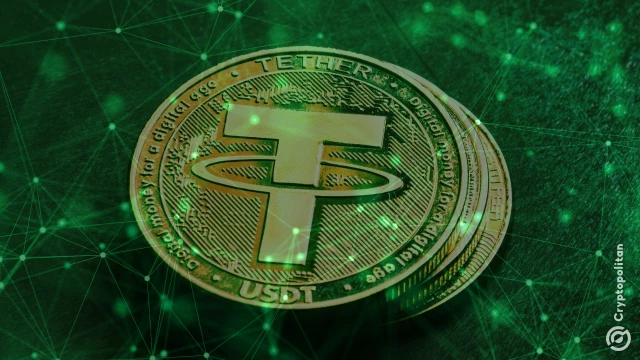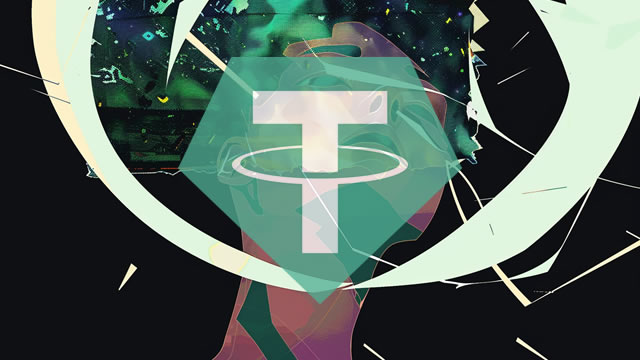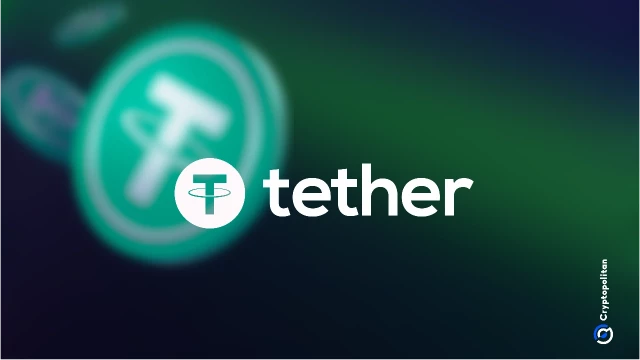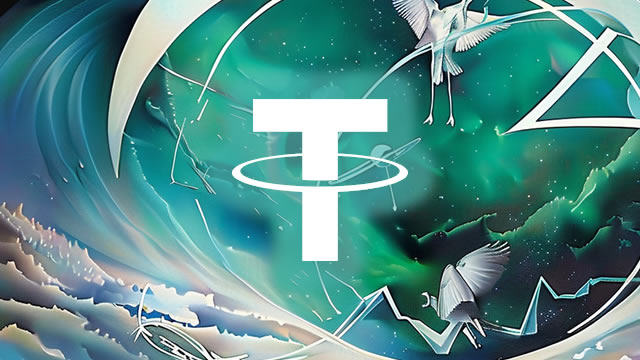Language
- English
- Română
Currency
- $ USD
- € EUR
Aptos Hits Major Milestones, Tether and Aave Involved


More News Articles
Aptos Price Could Surge Past $9 Amid Growing Activity
Aptos (APT) has emerged as a strong player in the crypto market, gaining attention for its innovative scalability features and growing on-chain activity. The blockchain network, which has made significant strides in blockchain technology, is becoming increasingly recognized for its potential to impact the decentralized ecosystem.
4 Altcoins to Sell Now to Prevent Long-Term Losses
The cryptocurrency market is witnessing a modest rebound, but some altcoins struggle. SAND, APT, BERA, and ARB face declining momentum, raising concerns among analysts.
Thai Police Seize $2.5 Million USDT from Alleged Scam Operation
A Tether spokesperson said it demonstrates “every transaction is traceable, every asset can be seized, and every criminal can be caught.”
Solana's Yakovenko claims Kamino is better economic value in feud with Aave's founder
The co-founder of Solana Labs Anatoly Yakovenko claimed Kamino produced more value than Aave, despite the lower value locked in its lending vaults.
Tether CEO Paolo Ardoino Says Quantum Computing Will Allow Hackers To Take Bitcoin From Lost Wallets
The chief executive of stablecoin issuer Tether (USDT) says that quantum computing will allow hackers to steal Bitcoin (BTC) from lost wallets.
Aave founder downplays Kamino amid discussion with key Solana figures
The founder of Aave downplayed Solana's Kamino during an argument with the president of the Solana Foundation and the co-founder of Solana Labs about decentralized money markets on X. Alex Svanevik, founder of Nansen, questioned the absence of Aave on Solana, which currently boasts Kamino as its largest money market protocol.
Aptos: Can THIS pattern help APT push past $9?
Aptos shows significant growth, driven by scalability innovations and increasing market confidence.
Bitcoin Stabilizes After Sharp Drop as USDT Inflows Hit $2.72B
Bitcoin (BTC) recently plunged to nearly $91,000 amid heightened trade war concerns, triggering significant market reactions. On the same day, centralized exchanges recorded a net inflow of $2.72 billion in tether (USDT), the largest stablecoin by market value, according to blockchain analytics firm IntoTheBlock.
Altcoins Surge: Sui ($SUI), Aptos ($APT), Theta Network ($THETA) - Market Analysis & Insights
Some of the altcoins are up more than 5% on Monday. Could this latest surge turn into something else, or will it be short-lived with the downtrend to continue?
Tether Inflows to Exchanges Achieve $2.7 Billion amid Bitcoin (BTC) Price Drop
Centralized crypto exchanges saw a record-breaking amount of Tether (USDT), the leading stablecoin pegged to the US dollar last week.
Tether CEO Addresses Quantum Computing Risks to Bitcoin Security
TL;DR Tether CEO highlights the long-term risks quantum computing could pose to Bitcoin's security, emphasizing that future advancements could enable the recovery of Bitcoin from lost or inactive wallets. The potential revival of Satoshi's dormant coins raises concerns about market stability, with analysts warning that reintroducing these coins could disrupt Bitcoin's supply dynamics.
Top Crypto News This Week: Aave Expansion, dTAO Upgrade, Coinbase Earnings, US CPI, and More
Several events are in the pipeline for the crypto market this week, including updates in the Aave, Bittensor, and Jupiter ecosystems, US economic data, earnings calls, and key token unlock events.
Tether CEO willing to explore quantum computing initiative to recover lost Bitcoin
Tether CEO Paolo Ardoino has shown interest in a proposal for a quantum-powered initiative aimed at retrieving lost Bitcoin. The idea, originally put forward by Bitcoin investor Brad Mills, suggests launching a white-hat treasure hunt to locate an estimated 3.7 million BTC that have vanished from circulation.
The quantum computers threaten the lost Bitcoin: revolution or risk? The opinion of the CEO of Tether
The risk is distant, but investors should prepare for the quantum revolution.
Latam Insights: Brazil to Empower Fund to Buy Crypto, Tether Talks Salvadoran Skyscraper
Welcome to Latam Insights, a compendium of the most relevant crypto and economic news from Latin America over the past week. In this week's edition, a Brazilian lawmaker introduces a bill to allow funds to purchase crypto, Tether details its Salvadoran skyscraper move, and crypto remittance volumes remain marginal in El Salvador.
Tron's Journey: From USDT Powerhouse to DeFi Hub in 2024 (CryptoQuant)
Tron's evolution from a USDT-dominant network to a budding DeFi hub resulted in a significant increase in its transaction count and network fees.
Tether's Paolo Ardoino says quantum computing will put lost Bitcoins back in circulation
Paolo Ardoino, Tether's CEO, claims that quantum computing, even when strong enough, won't crash Bitcoin's cryptographic system but instead raid lost wallets and put forgotten Bitcoins back into circulation.
Cryptocurrencies to watch this week: Aptos, Tapswap, Arbitrum
Cryptocurrency prices remained under pressure last week as concerns about a trade war between the United States and its top trading partners remained.
UNI & AAVE Tumble While BitLemons ($BLEM) Emerges as the Next 100x Utility Token
The DeFi sector witnessed significant turbulence this week, with major tokens recording substantial losses. Meanwhile, BitLemons ($BLEM) h
Tether CEO predicts quantum computing could recover lost Bitcoin
Auantum computing advances could return lost Bitcoin to circulation, including Satoshi Nakamoto's holdings if the creator is dead, Ardoino says.
Tether CEO Warns Quantum Computing Could Unlock Inactive Bitcoin Wallets
Tether CEO Paolo Ardoino has warned that quantum computing could eventually pose a threat to inactive Bitcoin wallets. The post Tether CEO Warns Quantum Computing Could Unlock Inactive Bitcoin Wallets appeared first on Cryptonews.
Quantum Computing Might Impact Satoshi Nakamoto's Bitcoin Holdings, Tether CEO Warns
Tether CEO Paolo Ardoino has dismissed concerns that quantum computing poses an immediate risk to Bitcoin's security.
Satoshi's Bitcoin Wallets Might Get Hacked, Tether CEO Predicts
Paolo Ardoino, the chief executive officer at stablecoin giant Tether, has predicted that the Bitcoin holdings of Satoshi Nakamoto might be put back in circulation in the future.
Quantum computing will bring lost Bitcoin 'back in circulation' — Tether CEO
Tether CEO Paolo Ardoino claims quantum computing will hack Bitcoin in "lost wallets" and return it to circulation — a move one trader warns could drag Bitcoin back to the "stone ages."
Quantum computing will bring lost Bitcoin' back in circulation' — Tether CEO
Tether CEO Paolo Ardoino claims quantum computing will hack Bitcoin in “lost wallets” and return it to circulation — a move one trader warns could drag Bitcoin back to the “stone ages.”
USDT Minting Surge on TRON, TRX Price Stalls
USDT minting on the TRON blockchain has surged dramatically, pushing the total supply of the stablecoin close to a historic peak. However, despite this significant increase in USDT supply, TRON's native token, TRX, has shown only modest growth, and its price remains largely unaffected by the surge in stablecoin minting.
Aptos Price Struggles: Unlocks and Bearish Momentum Weigh on Market
Aptos (APT) has struggled with steady selling pressure over the past two months, and recent token unlock events may exacerbate these challenges. With increasing unlocks and panicked sentiment in the market, APT could face more downside in the near future.
Tether CEO Predicts Lost Bitcoin Wallets Vulnerable in Quantum Future, Satoshi's Stash at Risk
Tether CEO Paolo Ardoino predicts bitcoin users will transition to quantum-resistant addresses long before advanced computers pose a genuine threat to its cryptography, though millions in lost coins — potentially including Satoshi Nakamoto's stash — could face risks.
Here's the impact on TRX after USDT minting on TRON nears record high
USDT minting on TRON has surged, but the asset hasn't quite responded very quickly.
Tether pursues aggressive dealmaking as wealth is expanding
With $140 billion in stablecoins under its control and $7 billion in excess reserves, the crypto giant Tether is reportedly splashing cash on everything from AI to right-wing media.
USDT Market Cap Hit an ATH of $141B Amidst Stablecoin Regulation Plans
The market cap of USDT reached an all-time high of $141.76 billion. Stablecoin regulation is gaining momentum as global leaders propose a bill.
Tron Social Dominance Climbs As USDT Balance Nears ATH
The remarkable change the TRON blockchain is going through confirms its strong presence in the cryptocurrency scene. Driven mostly by stablecoin transactions and a growing memecoin industry, recent data exposes a solid increase in network activity.
Tether and Reelly Partner to Bring Stablecoin Transactions to Over 30,000 UAE Real Estate Agents
Tether has partnered with Reelly Tech to integrate USDT transactions into the UAE real estate market, allowing 30,000+ agents to leverage stablecoins for streamlined property transactions.
Aptos holders beware! Here's why unlocks could bring more pain to market
The 1-week heatmap threw the $5.5 liquidity cluster into sharper relief.
Tether CEO unbothered by USDT competition
Tether's CEO, Paolo Ardoino took to X (formerly Twitter) to express his bullishness about his company's market position. The CEO's statement came in response to growing competition within the stablecoin market.
3 reasons why AAVE price may surge 200% this year
AAVE declined for the second consecutive week, mirroring the performance of most altcoins as tariff risks remained a concern. AAVE (AAVE) token fell to a low of $196.
Tether CEO Explains Why USDT Is Still Ahead Of Competitors
Tether CEO Paolo Ardoino has reaffirmed the company's strong market position amid increasing competition in the stablecoin sector. Speaking at the PlanB Forum in El Salvador and later addressing concerns on social media, Ardoino emphasized that Tether has spent the past decade building an extensive global distribution network.
$1 Billion USDT Gets Minted on TRON – Will TRX Hit $1?
Tether is continuing to expand its stablecoin supply by minting $1 billion batches of USDT on the TRON blockchain. The move is a sign of Tether's commitment to bolstering liquidity across chains, while also highlighting the rapid expansion of TRON's DeFi ecosystem.
USDT balance on TRON nears all-time high
The balance of Tether's stablecoin, the largest in the world by market share, has surged to near all-time highs on the Tron network.
Tether CEO ‘not worried' about concerns over USDT competition
Tether CEO Paolo Ardoino dismissed concerns about stablecoin competition. Tether CEO Paolo Ardoino has dismissed concerns about competition in the stablecoin market, emphasizing Tether's (USDT) decade-long growth and extensive distribution network.
Tether News: Tether to Ramp Up Deals as ‘Establishment' Finally Welcomes It
Tether is poised to grow in the United States as Paolo Ardoino showed optimism with allies in government.
Tether (USDT) Flips XRP in Crypto Rankings, What's Next?
In a fresh shake-up, Tether (USDT) stablecoin has once again overtaken XRP in the crypto market rankings. With a market capitalization of $141.4 billion, Tether now ranks as the third largest cryptocurrency, pushing XRP to the fourth spot with a current market valuation of $139.72 billion.
Stablecoin issuer Tether to expand dealmaking beyond crypto: report
With billions in excess reserves, Tether now wants to accelerate its expansion into sectors beyond crypto, a report reveals.
Tether's new AI tech translates brain signals into speech
Stablecoin issuer Tether is advancing its AI initiatives with a focus on translating brain signals into speech. In a Feb. 6 post on X, Tether CEO Paolo Ardoino revealed that Tether Data's research and development (R&D) team has built an electrocorticography (ECoG) plugin.
Aptos (APT) Could See A 95% Rebound, But It Must Hold This Level – Analyst
Following the market's recent corrections, Aptos (APT) has revisited the lows of its Macro Range, hitting a six-month low at the start of February. According to an analyst, the cryptocurrency's recovery and ongoing retests of this crucial level could lead to a rebound in the following months.
Tether Partners with Reelly to Streamline UAE Real Estate Transactions Through USDT
Tether and Reelly Tech join forces to revolutionize UAE's real estate industry by implementing stablecoin payments and launching educational initiatives.
Balancer V3 launches on Arbitrum, integrating Aave V3 and boosting yield
Arbitrum has deployed Balancer V3, a major upgrade that enhances network liquidity through advanced automated market maker features.
Tether CEO Paolo Ardoino Says Firm Working on Several AI Products, Including Bitcoin Wallet Assistant
Tether CEO Paolo Ardoino just unveiled some of the artificial intelligence (AI) products that the stablecoin company is currently working on.







































































